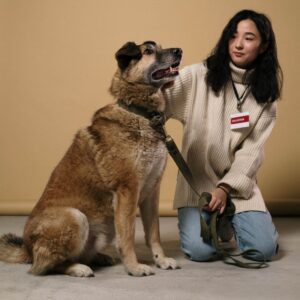 By: Ellen Lenox Smith
By: Ellen Lenox Smith
We were recently enjoying watching the new show “Transplant” when in one scene, my heart sank and tears began to flow. They showed a scene in the hospital with a young man and his parents getting the news that he was nearing the end of his life due to cystic fibrosis. And if that wasn’t emotional enough, they showed his service dog jump onto the side of the bed to comfort his partner, sensing something was terribly wrong. And there they were, dog and man reaching out, touching, and caring for each other, providing love and comfort to each other. And tears continued.
I lost my precious service dog, Maggie, four months ago and that scene brought the memory and emotions I felt from the comfort and care she provided me. She was by my side through many of my 26 surgeries. It’s hard to express the tremendous support she was able to provide and it was shocking how rapidly she could sense when I needed her extra love. Although I lost her, to this day, I still feel her nose on my thigh that I would wake up to and can remember the sensation of running my fingers over her soft ear lobe. She is gone, but she is with me always.
This show made me realize that when COVID-19 patients are in the hospital separated from their families, service dogs are also being separated from their partners. To some, that may seem trivial but for those, like me, that have or have had the pleasure of true love, help, and companionship, this separation is also devastating.
So what can we do to help this horrible separation?
- Offer to temporarily foster your family or friend’s service dog to help provide them peace and caring. Remember this is a terribly devastating process for these service dogs not seeing their companion you and trying to do their job to help.
- Send photos of the dog, and see if you can Facetime with the patient and dog so they can see each other.
- If you are volunteering to help in a hospital or other location of care, offer to take the service dog outside and feed the dog.
- See if you are able to bring the dog to the facility to see their partner through the glass or maybe visit together outside.
- Talk with the patient separated from their dog and let them vent their sadness and lost feeling without their best friend by their side.
- Consider offering to hang photos of the dog around the room so they are keeping them close in their hearts and thoughts.
- Offer to groom the dog for the patient since these dogs are brushed and wiped down with a wet cloth to remove dander to be in the public.
- See if you can continue to use the commands the dog was trained with to keep them active and ready for their job when their partner leaves the hospital.
- If the match of the service dog does not survive or becomes incapacitated, then a plan as to where the dog will go is needed to be ready. If the match has been under three years, many times the organizations want to see the dog returned for an evaluation and decision as to whether the dog can be prepared to work with a new match.
We are enduring horrific times. Each day, we hope to wake up grateful to be alive and well. However, we also cope daily with the reminder that at a split moment, life can be taking a different course, if we contract COVID-19.
If you or someone you care about also is lucky to have a service dog, then we also need to think ahead about what the plan would be to be sure they are fed, cared for, and safe, if a separation must happen.
May you all stay healthy and safe as you also continue to hold on to hope and a brighter future.
About Ellen Lenox Smith:

Ellen Lenox Smith has emerged as a leading voice for patients living with pain. Featured in local and national press accounts, Ellen brings a reasoned and compassionate perspective to the need for safe patient access to effective therapies, especially medical cannabis. Currently, Ellen serves as Co-Director of Medical Cannabis Advocacy for U.S. Pain Foundation and is a member of its Board of Directors. She also serves on the Rhode Island Patient Advocacy Coalition as secretary, was appointed by the governor to the Adaptive Telephone Equipment Loan Program, and is part of the Oversight Committee for the Compassion Centers in RI. She is also active with the EDS RI support group. Prior to patient advocacy, Ellen was a longtime middle school social studies teacher. She has been married for 46 years and is the proud mother of four adult children and grandmother to five grandchildren. She also is the author of two books, an organic gardener, and was previously a master swimmer and high school swim teacher.
